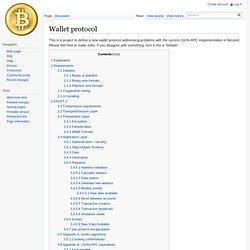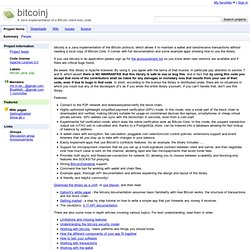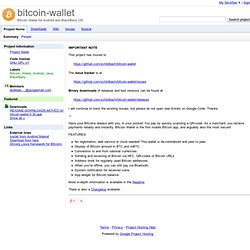

Category:Clients. Wallet protocol. This is a project to define a new wallet protocol addressing problems with the current JSON-RPC implementation in bitcoind.

Please feel free to make edits. If you disagree with something, turn it into a "debate". Explanation This protocol aims to be a standard for communication between Wallets and User Interfaces. It can be used to access a Wallet remotely, or even locally, even if the Wallet and User Interface are produced by different or competing vendors. Please see the Infrastructure page for an overview of where this protocol fits into the big picture.
Requirements Debates Binary or plaintext Binary is more efficient to parse and create Plaintext is easier for humans to debug, and avoids forming a dependency on a specific number of bits, endianness, or precision Binary can include custom transactions as-is for transmission Binary wire formats Protobuf seems efficient and easy to use from all major languages Plaintext wire formats JSON implementations tend to be buggy. Cooperative mining. Original Bitcoin client. Bitcoinj - A Java implementation of a BitCoin client-only node. Bitcoinj is a Java implementation of the Bitcoin protocol, which allows it to maintain a wallet and send/receive transactions without needing a local copy of Bitcoin Core.

It comes with full documentation and some example apps showing how to use the library. If you use bitcoinj in an application please sign up for the announcement list so you know when new versions are available and if there are critical bugs found. Be aware: this library is Apache licensed. By using it, you agree with the terms of that license. In particular pay attention to section 7 and 8, which assert there is NO WARRANTEE that this library is safe to use or bug free, and in fact that by using this code you accept that none of the contributors shall be liable for any damages or monetary loss that results from your use of their code, even if due to bugs in that code.
Features: Connect to the P2P network and download/parse/verify the block chain. Download the library as a JAR, or use Maven, and then read: Jb55/node-bitcoin at - GitHub. Tcatm/bitcoin-js-remote at master - GitHub. Andrewschaaf/node-bitcoin-p2p - GitHub. Andrewschaaf/node-bitcoin-explorer - GitHub. Andrewschaaf/node-bitcoin-impl - GitHub. Kiba/chrome-bitcoin - GitHub. Bitcoin-wallet - Bitcoin Wallet for Android. This project has moved to The issue tracker is at Binary downloads of releases and test versions can be found at I will continue to track the existing issues, but please do not open new tickets on Google Code.

Thanks. Have your Bitcoins always with you, in your pocket! No registration, web service or cloud needed! More in-depth information is available in the Readme. There is also a Changelog available. QBitcoin. QBitcoin Wallet. The QBitcoin Wallet is a separate process allowing wallet manipulations.

It is meant to be lightweight, and portable. It depends on no external library and only manages what needs to be managed: the wallet. Unlike the Original Bitcoin client wallet, the QBitcoin wallet contains no information on the amount stored on each address (this is up to the frontend). Technical Specifications Communications with front end When the wallet is launched, it will open the SQLite database file passed as first argument and output "READY". SEED x This command allows giving more randomness to the generated bitcoin addresses. The parameter is a hexadecimal random string (max 32 bytes). When the wallet shuts down, it will save its entropy to the wallet db file, and seeding is added to the existing entropy. RAND x Should the front end need some random bytes, it can ask that to the wallet. Wallet Encryption Wallet encryption is achevied by storing a 4096 bytes RSA key pair in the wallet.